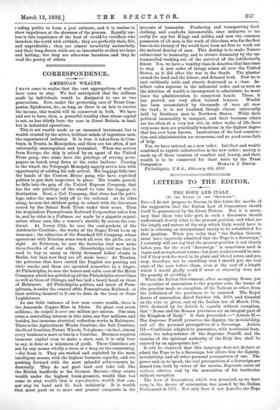CORRESPONDENCE.
AMERICAN WEALTH.
I HAVE come to realise that the vast aggregations of wealth have come to stay. We had anticipated that the millions made by individuals would be dissipated in one or two generations. Now, under the protecting care of Trust Com- panies, Syndicates, Br..c., as long as there is an heir to receive
the income, this wealth will be conserved in bulk. We have and are to have, then, a powerful wealthy class whose capital is not, as has chiefly been the case in Great Britain, in land, but in industrial operations.
This is not wealth made as an unearned increment, but is wealth created by the active, brilliant minds of ingenious men, the organisers of industry. It is true it takes form in Com- bines, in Trusts, in Monopolies, and these are too often, if not universally, unscrupulous and tyrannical. When one arrives from Europe, the ship is seized by an agent of the United Press gang, who alone have the privilege of serving news- papers on board, away down at the outer harbour. Coming to the wharf, the Telegraph Monopoly eagerly serves him with opportunity of cabling his safe arrival. His baggage falls into the hands of the Custom House gang, who have exploited politics to put their inspectors in place. His trunks passed, he falls into the grip of the United Express Company, that has the sole privilege of the wharf to take his luggage to -destination. Next, a Cab Company, that alone has the privi- lege, takes the man's body off to the railroad. As he rides along, he sees the children going to school with the literature issued by the School Book Trust under their arms. Then the stupendous Pennsylvania Railroad Corporation takes him in, and he rides in a Pullman car made by a gigantic organi- sation whose cars, like a weaver's shuttle, fly across the con- tinent. At Jersey City, he sees the coal-pockets of the Anthracite Combine ; the works of the Sugar Trust loom up immense ; the refineries of the Standard Oil Company, whose operations with Briarian arms reach all over the globe, are in :sight. At Pattersen, he sees the factories that now make three-fourths of all our silks. (Strawbridge told me that he used to buy as many as thirty thousand ladies' cloaks in Berlin, but that now they are all made here.) At Trenton, the potteries that have ousted the English are pouring out their smoke, and these are operated somewhat in a league. At Philadelphia, he sees the horses and cable cars of the Motor Company, which has gobbled up all the Philadelphia street-lines as well as those of Chicago, and has laid a heavy hand on those of Baltimore. All Philadelphia politics, and much of Penn- sylvania, is under the control ofthe Pennsylvania Railroad: at least nothing inimical to it can be done in the local or State Legislatures.
As one little instance of how men create wealth, there is the Anaconda Copper-Mine in Idaho. Its plant cost seven millions ; its output is over one million per annum. One man owns a controlling interest in this mine, say four millions, and besides, has immense electrical reduction works in Baltimore. 'There is the Agricultural Works Combine, the Salt Combine, the Steal Combine, Patent Wheels, Telephone,—in fact, almost -every business is more or less in a Combine. Business requires immense capital even to make a start, and, it is only true to say, is done at a minimum of profit. These Combines are not by any means wholly a curse or a drag on the community, —far from it. They are worked and exploited by the most intelligent means, with the highest business capacity, and are pushing forward with the most splendid achievements in- dustrially. They do not grab land and take toll, like the British landlords or the German Barons,—they create wealth under the highest brain-pressure, wealth that has come to stay, wealth that is reproductive, wealth that can- not stay its hand and lie back indolently. It is wealth that must push on to more and greater conquests in the
interests of humanity. Producing and transporting food, clothing, and comforts innumerable, once unknown or too costly for any but Kings and nobles, and now the common possession of all men, is the work of this class, who for the first time in the history of the world have been set free to work out the natural destiny of man. This destiny is to make Nature subservient to humanity, and to elevate humanity by the un- trammelled working out of the survival of the intellectually fittest. Yes, we have a. wealthy class in America that has come to stay. A new order of things arises all over the United States, as it did after the war in the South. The planter owned the land and the labour, and debased both. Now he is cast ruthlessly aside and utterly destroyed as a class. In- tellect rules supreme in the industrial order, and as soon as the inheritor of wealth is incompetent to administer, he must leave the administration to competent hands. These, it has proved, are very often trained lawyers. Wealth has been accumulated by thousands of men all over the land ; it is not localised, though almost universally held by Northern men in Northern States. While their political immorality is rampant, and their business ethics are too often at a very low ebb, in other walks of life these very same men are practically beneficent in the highest degree that has ever been known. Institutions of the best construc- tion and administration are numerous, and no good cause fails of help.
Yes, we have entered on a new order. Intellect and wealth combined to exploit industrialism is the new order; society is made up of these creators of comfort and luxury, and their wealth is to be conserved for their heirs by the Trust


































 Previous page
Previous page